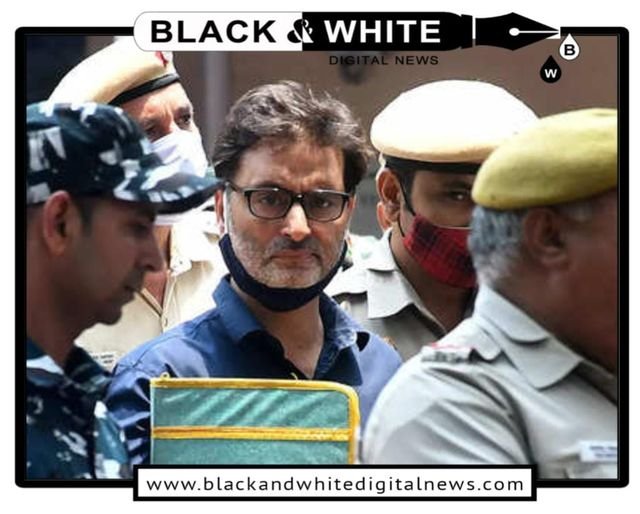“Delhi High Court Judge Recuses Himself from Hearing NIA’s Death Penalty Plea Against Yasin Malik”
||Black and White Digital News||
||Parvinder Singh July 12,2024 ||
New Delhi :In a dramatic turn of events, Delhi High Court judge Amit Sharma on Thursday recused himself from hearing a high-stakes plea by the National Investigation Agency (NIA) seeking the death penalty for separatist leader Yasin Malik in a terror funding case. This unexpected development has shifted the judicial process to a new phase, sparking considerable attention and debate.
Recusal and Reassignment: A Twist in the Judicial Proceedings.
The matter, now under intense scrutiny, was promptly listed before a division bench headed by Justice Prathiba M Singh following a change in the roster of judges handling such critical cases. “List before another bench, of which Justice Sharma is not a member, on August 9,” declared Justice Singh, setting a new course for the case.
Yasin Malik: Virtual Presence and High-Risk Status.
Yasin Malik, the prominent Jammu and Kashmir Liberation Front chief, currently serving a life sentence in Tihar jail, made a virtual appearance during the court proceedings. The court has directed that Malik will continue to appear virtually for the next hearing on August 9. This decision aligns with the high court’s earlier stance on May 29 last year, which permitted virtual appearances for Malik, recognizing him as a “very high-risk prisoner” whose physical presence in court could potentially jeopardize public order and safety.
NIA’s Pursuit of Capital Punishment: A Case of National Significance.
The NIA’s plea, seeking to escalate Malik’s life sentence to the death penalty, stems from a trial court’s decision on May 24, 2022. The trial court found Malik guilty of grave offenses under the stringent Unlawful Activities (Prevention) Act (UAPA) and the Indian Penal Code, sentencing him to life imprisonment. Malik had admitted to the charges, leading to his conviction and life sentence.
Arguments for Death Penalty: NIA’s Standpoint.
The NIA has staunchly argued that merely pleading guilty should not exempt a terrorist from capital punishment. The agency asserts that allowing dreaded terrorists to avoid the death penalty by pleading guilty would undermine the integrity of the sentencing policy, providing an escape route for those guilty of heinous crimes. Emphasizing the severity of Malik’s offenses, the NIA contends that a life sentence is grossly inadequate given the enormity of the crimes, which have inflicted profound losses on the nation and the families of soldiers.
Trial Court’s Perspective: Balancing Justice and Severity.
The trial court, which previously rejected the NIA’s plea for the death penalty, acknowledged that Malik’s crimes struck at the “heart of the idea of India,” with intentions to forcefully secede Jammu and Kashmir from the Union of India. However, it concluded that the case did not meet the “rarest of rare” criteria required for awarding the death penalty. The court’s stance highlighted a nuanced approach, balancing the gravity of the crime with the stringent standards for capital punishment.
Legal and Public Discourse: A Nation Watches Closely.
This high-profile case continues to evoke significant legal and public discourse, reflecting the broader tensions and challenges in addressing terrorism and national security. As the case advances to the next hearing, all eyes remain fixed on the judicial developments and the potential implications for the nation’s legal and security framework.
Awaiting the August 9 Hearing…
With the case now set to be heard by a different bench on August 9, the anticipation and stakes remain high. The judicial process’s outcome will undoubtedly have far-reaching consequences, not only for Yasin Malik but also for the broader legal and national security landscape in India.



